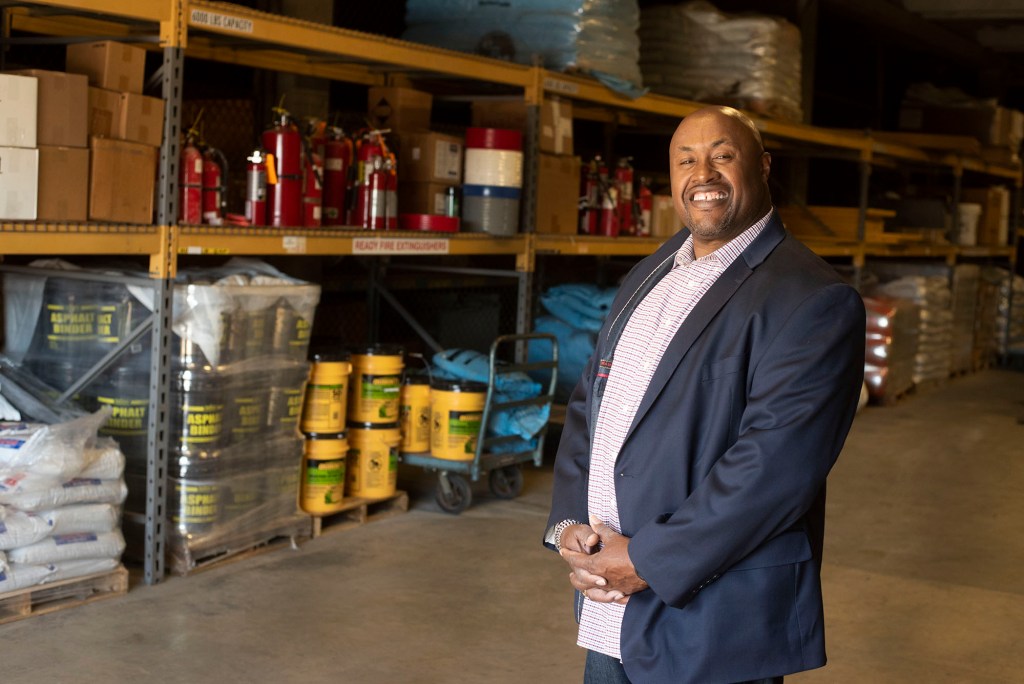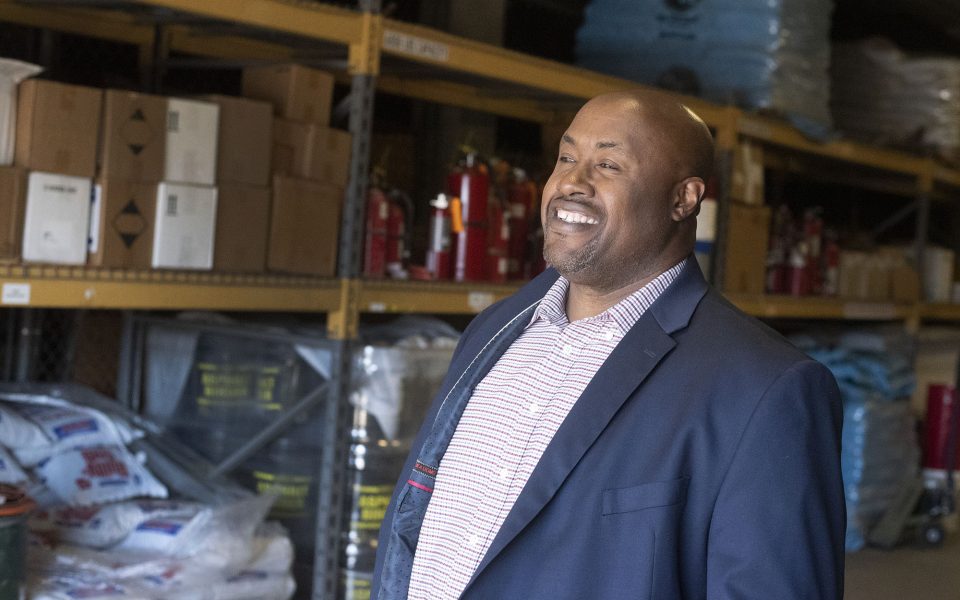Featured photo: Victor Vincent Jr. is the founder and sole employee of the Re-Entry Project, a business that works with formerly incarcerated individuals from all over the country to help them reassimilate back into society. (photo by Stan Sussina)
On Aug. 8, 1988, Victor Vincent Jr.’s girlfriend doused him in lighter fluid and tried to set him on fire.
“She had called the police and I tried to explain what happened to them,” Vincent says. “[The police] just weren’t hearing it.”
When they tried to arrest him, Vincent says he tried to fight them off.
“I broke an officer’s leg, arm and nose,” Vincent says. “I was sentenced to 10 years in prison.”
On a recent Monday afternoon, Vincent sits in a fluorescent-lit room wearing a collared shirt that has the city of Greensboro logo embroidered on the chest. He wears a large, ruby-studded ring, and closes his eyes for long periods as he speaks. He’s calm and collected, but he wasn’t always this way, he says.
“Prison is the most violent place you can ever be,” he says. “It’s barbaric. It’s unreal and it breaks everybody. For years, I cursed God for what I went through. But because of my story, I’m able to talk to people.”
Vincent is the founder and sole employee of the Re-Entry Project, a business that works with formerly incarcerated individuals from all over the country to help them reassimilate back into society. Starting on Friday, Vincent will be hosting a series of events called Second Chance: The Creative Impulse of the Judicially Challenged at Elsewhere Museum to showcase the talents of “judicially challenged” individuals like him.
“We came up with the term ‘judicially challenged’ because a lot of people who go to prison aren’t guilty of the crimes that landed them there,” Vincent says. “So why should we call them ex-cons?”
After being released from prison, Vincent got his GED, his driver’s license and a commercial driving license. In 2005, he moved to Greensboro from Baltimore and eventually landed a job with the city, picking up trash. In 2008, he enrolled at Guilford College to study criminal justice, becoming president of the Student Government Association while he was there.
“That’s when I made the promise to help people like me,” he says. “To help people find jobs and follow their dreams.”

Once he graduated, he started working with inmates by showing them what life outside of prison could look like.
“Everybody wants to be rich and famous but most of us will never achieve that,” Vincent says. “The point was to show that I work a 9-5 job and my home life is excellent and you can achieve the same thing.”
Soon afterwards, he started the Re-Entry Expert.
When Vincent first meets a client, he asks them what their hobbies and dreams are. If they want to be a rapper, he maps out a plan for them in which they secure a job somewhere so they can maybe take music development classes at the local community college or build a recording studio at home. He envisions a life for them in which they can live out a realistic version of their dreams.
“There’s some kind of talent in everybody and for some reason, I’m good at figuring it out,” Vincent says.
In this way, he’s like a motivational speaker, a social worker and therapist all in one.
“It’s only the fear inside of you that’s keeping you from being successful,” Vincent says. “Don’t get me wrong, you’re going to hit every obstacle, but I’ve hit every single one so I’m good at telling people how to get around these barriers.”

When Vincent thinks about his work, he remembers the people who helped him after he was released to the ones who tried to hold him back. In particular, he recalls a supervisor he had when he worked at the city picking up trash.
“He was surprised that I was going to college,” Vincent recalls. “He told me, ‘I thought you’d be picking up trash for the rest of your life.’”
And that’s the problem with society right now, Vincent says. They underestimate and judge people like him. But he’s working to change that.
“We aren’t giving people second chances,” Vincent says. “You have to look outside of people’s pasts. I find a gift in every client. What I would really like is for us to create a path for people to gain their rights and freedoms back.”
Second Chance events start on Friday at 6 p.m. with an opening reception at Elsewhere Museum. To find the schedule and learn more about the event, visit elsewheremuseum.org/projects/secondchance. To learn more about the Re-Entry Expert, visit thereentryexpert.org.
Join the First Amendment Society, a membership that goes directly to funding TCB‘s newsroom.
We believe that reporting can save the world.
The TCB First Amendment Society recognizes the vital role of a free, unfettered press with a bundling of local experiences designed to build community, and unique engagements with our newsroom that will help you understand, and shape, local journalism’s critical role in uplifting the people in our cities.
All revenue goes directly into the newsroom as reporters’ salaries and freelance commissions.


Leave a Reply